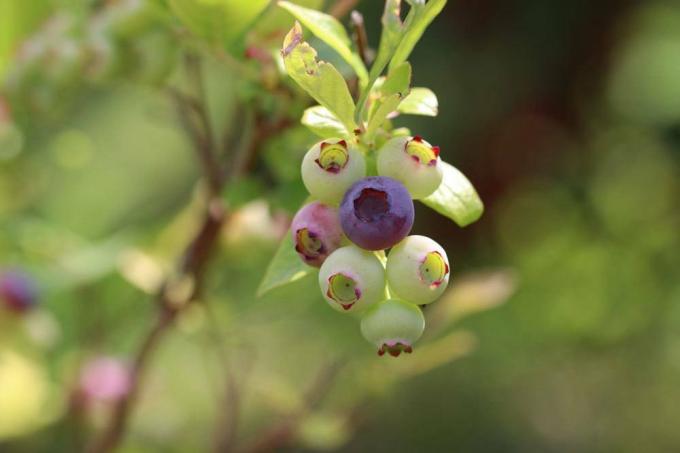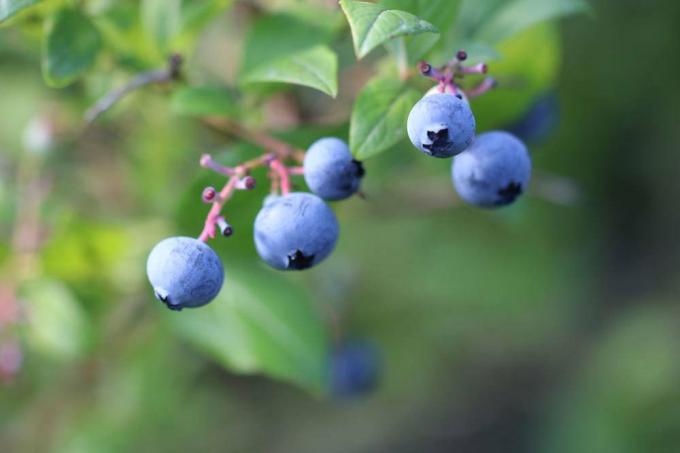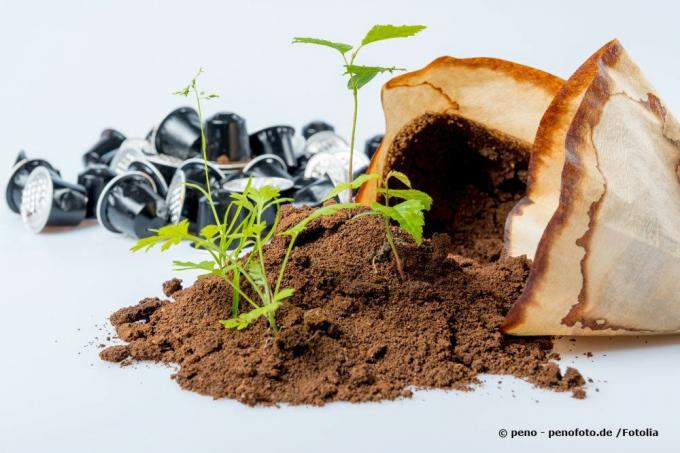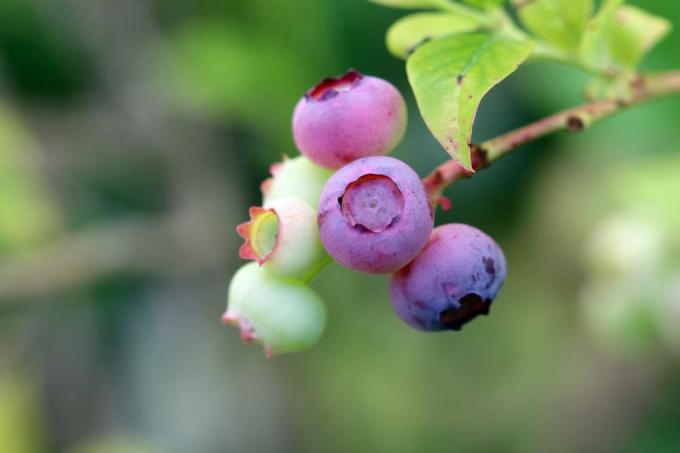
table of contents
- Fertilize blueberries
- time
- Fertilize minerally
- Fertilize organically
- Naturally
- Organic fertilizer from the trade
- Horn meal
- Coffee grounds as a home remedy
- Mulching over the winter
- Pay attention to lime
As a bog bed plant, blueberries cultivated in their own garden need a little fertilizer support for a rich harvest. Here, fertilizers from the trade or household remedies can be used. It is also important to choose the right time for adding the nutrients so that the fertilizer can support the flowering and fruiting well. The following article explains which fertilizers and home remedies you should ideally fertilize with and when the right time is to do so.
Fertilize blueberries
time
There isn't just one time when the blueberry plants, also known as blueberries, should be fertilized. Sufficient nutrients should always be provided twice over the vegetation phase. The different times for fertilizing look like this:
- first nutrients when planting
- in the following years first large fertilization in March
- promotes the growth of young shoots
- second, smaller fertilization in June
- during fruiting
- serves a rich harvest

At the different times it is also important to use different nutrients, so that the desired goal - growth in spring and fruit formation in summer - is achieved will. For example, you should refrain from using nitrogen for the second fertilization in June, because this primarily promotes the rapid growth of the shoots, but not fruit formation.
Fertilize minerally
Blaukorn or other long-term fertilizers are often used in the vegetable and ornamental garden. For blueberries, however, these fertilizers contain too high concentrations of salts and often end up with over-fertilization of the plants. As a rule, this always leads to damage to the roots, and the plant stops growing and fruiting. The better alternative here is always organic fertilization. In addition, blue grain and Co. also harbor the following dangers:
- chemical additives penetrate the soil
- come in contact with the groundwater
- chemical fertilizing does not do well on edible plants
- harvested blueberry fruits may contain chemical additives
- are absorbed by the human body when consumed
Fertilize organically
Naturally
If the blueberries are planted in the first year, then it makes sense to fertilize organically here and incorporate the nutrients directly into the soil. This has the advantage of long-term fertilization that only needs to be done once a year. Anyone who owns a garden has the organic fertilizers regularly available. However, you should avoid pure compost, because it contains other nutrients that blueberries cannot tolerate. When planting and in the following years in spring, the following natural nutrients should be added to the soil around the plant:
- Lawn clippings
- Pieces of bark (chopped)
- leaves
- Needle litter
It is important that you prepare the bed with the components a month before planting so that the Nutrients can develop properly and the blueberries absorb them directly from the roots from day one can. Because with organic fertilizer it is the case that the nutrients here first have to be decomposed before they can be absorbed by the plants.
Organic fertilizer from the trade
But how can blueberries cultivated in the bucket be fertilized? There is also a solution for this, because the trade also offers organic fertilizers in addition to mineral fertilizers. Therefore, if you have grown your blueberries on the balcony due to the lack of a garden, you can also get the organic remedies from specialist shops. It is important here that the nutrients contained are also tailored to the needs of the blueberry plants. These should always contain the following nutrients:
- nitrogen
- sodium
- phosphorus
- no lime additives
If the plant is supplied with organic fertilizer from the trade, then there is a large fertilization in spring and a smaller fertilization again in June. This optimally supplies the blueberries with the nutrients they need.
Horn meal
The horn meal is also organic, as it comes from the hooves and horns of slaughtered animals. This is also a good alternative to fertilizing in the spring to stimulate the plant's growth as it contains nitrogen. Ideally, horn meal is only given in conjunction with other fertilizers. The agent is available in well-stocked specialist shops.
Coffee grounds as a home remedy
Coffee grounds can also be used as a suitable fertilizer for blueberries. This is also used in spring when replanting or an existing blueberry plant. Because coffee grounds contain many nutrients such as potassium, nitrogen and phosphorus, which promote the growth of the plant. There should be a sufficient amount depending on how many plants you are growing. You should therefore proceed as follows for the coffee grounds:
- Collect coffee grounds over the winter
- to do this, let the used filter dry
- Transfer the completely dry powder into the container
- do not close airtight
- use the fertilizer obtained in this way in spring
- together with the organic fertilizer
- can also be used individually

tip: To ensure that the coffee grounds do not go moldy over the months in which they are collected, they must be completely dry before you put them in the storage container. For example, the coffee grounds can be dried in the oven at low temperatures or on a running heater.
Mulching over the winter
If you mulch over the earth around the plant in winter, then this not only has a protective effect against frost. In this way, nutrients are released into the soil at the same time, which the blueberries need in spring to sprout well. Mulch usually consists of bark cuttings, leaves or needle litter, which should also be given for spring fertilization.
Pay attention to lime
Blueberries need an acidic soil environment. You should therefore make sure not to add too much lime. You should therefore absolutely avoid fertilizers from the trade, which have a high proportion of lime. But there are certainly products specifically for blueberries, alternatively for rhododendrons or azaleas, which are tailored to the needs of the berries. So you should pay attention to the following when avoiding lime:
- only water with rainwater
- Tap water usually too calcareous
- alternatively only filtered water from the tap
- do without fertilizers with added lime
- yellow leaves indicate calcium chlorosis
If you use flower fertilizers, you must check the ingredients so that the fruits do not absorb any substances that are harmful for consumption.


